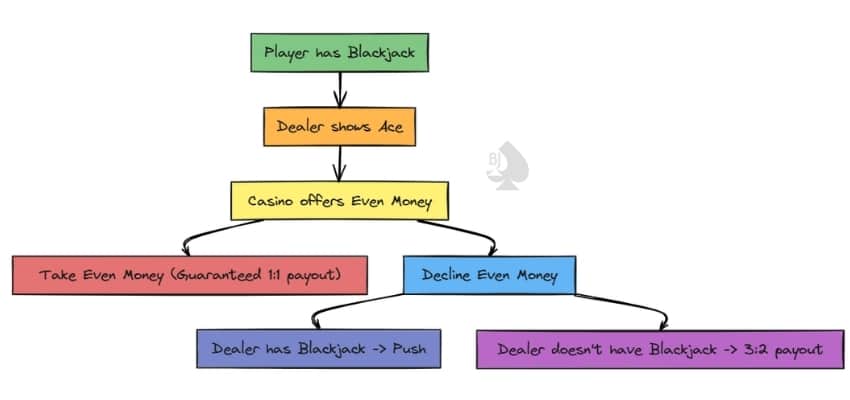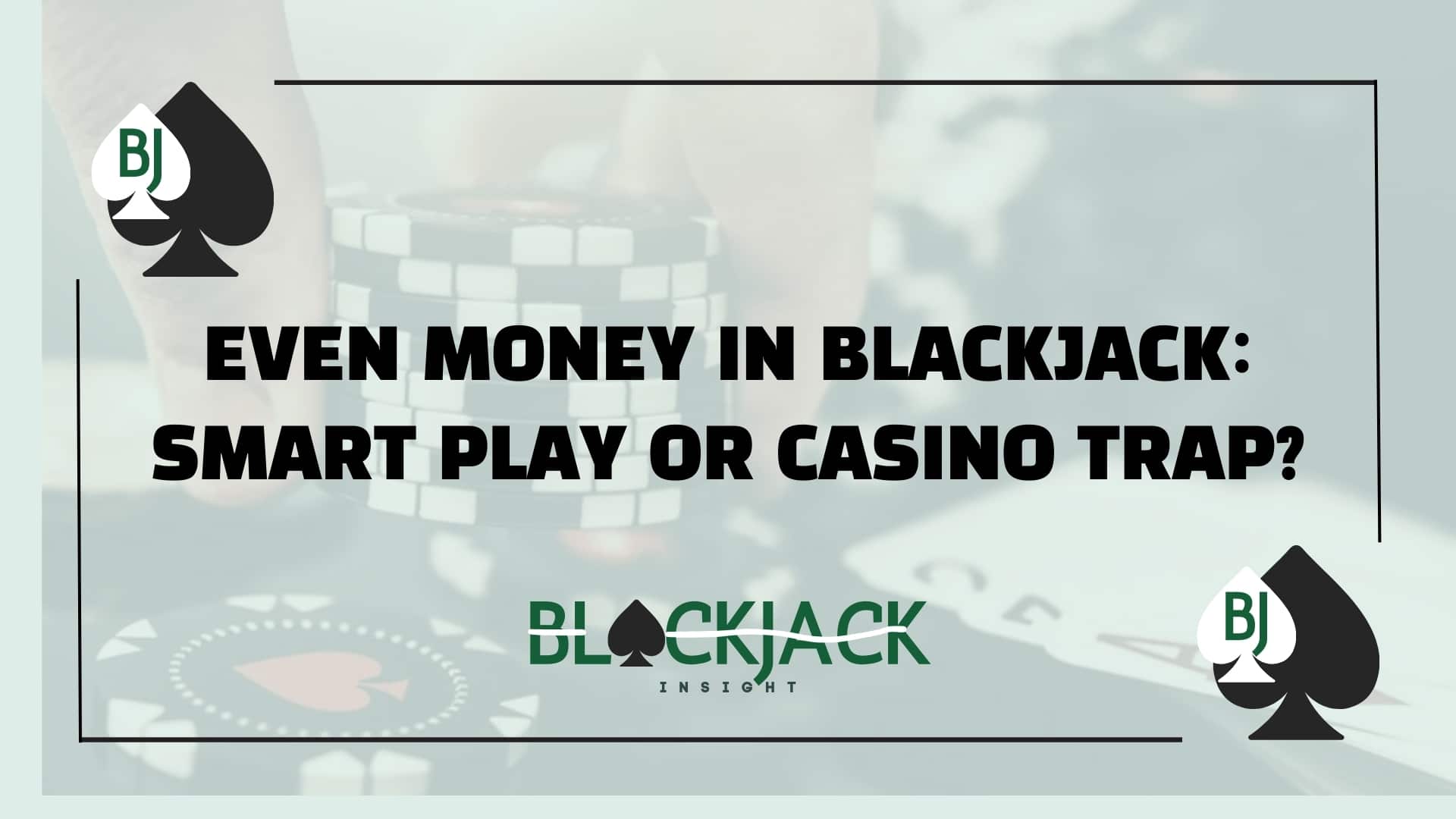Even Money in Blackjack: Smart Play or Casino Trap?
Table Of Content
If you’ve played even a few hands of blackjack, chances are you’ve heard the dealer say something like, “Even money?” right after you land a natural blackjack and they’re showing an Ace.
The first time I heard it, I froze. What does even money mean in blackjack? Is it a good thing? Is the dealer trying to help me… or help the house?
Here’s the thing—even money in blackjack is one of those plays that sounds like a safe bet, and hey, sometimes it is. But more often than not, it’s a move that favors the casino, not the player.
Let’s break it down in plain English so you know exactly what you’re agreeing to the next time that offer hits the table.
What Is Even Money in Blackjack?
It is an option presented to you when you hold a natural blackjack (an Ace and a 10-value card) and the dealer’s upcard is an Ace. The dealer offers a guaranteed 1:1 payout before checking their hole card for blackjack.
Context: Why Is This Offered?
Even money is the answer to what insurance is in blackjack, indeed, which is like a side bet against the dealer having blackjack. By accepting it, you’re locking in a profit regardless of the dealer’s hole card.
Example Scenario:
- You have a blackjack, and the dealer’s upcard is an Ace. Instead of risking the standard 3:2 payout if the dealer doesn’t have blackjack, you accept an even money payout of 1:1. This guarantees a win but sacrifices potential earnings.
Personal Note: The first time I encountered even money, I took it out of sheer nerves. It wasn’t until later that I understood how the odds played out.
Even Money vs. Insurance: What’s the Difference?
This is where people get confused—understandably so.
It is actually just insurance in disguise. When you accept it, you’re automatically placing an insurance bet and being paid out based on the assumption that the dealer has blackjack.
Here’s how it breaks down:
- You bet $10 and get blackjack.
- Dealer shows Ace.
- You take even money → you win $10 (instead of $15).
- If the dealer has blackjack, it’s a push—but you keep your even money.
- If the dealer doesn’t have blackjack, you still only get $10 instead of $15.
So yeah, even money and blackjack insurance are mathematically identical in this situation.
When to Take Even Money in Blackjack
Alright, here’s the truth: you should almost never take even money.
Why? Because in the long run, you’re giving up better payouts for short-term security. And while blackjack is definitely a game of moments, it’s also a numbers game.
Let’s do a little math.
The dealer will have blackjack roughly 30% of the time when showing an Ace. That means 70% of the time, they won’t, and you’re better off taking the 3:2 payout.
If you took it every time, you’d consistently win 1:1. But if you decline and let it ride, you’ll win 1.5x your bet most of the time—and only push occasionally. Over time, that adds up in your favor.
The only exception? Maybe you’re playing in a tournament where a push would cost you a lead, or you’re in a high-stakes game and protecting profit is more important than playing perfect odds. But that’s a rare spot to be in.
Pro Tip: Think of even money as paying for “peace of mind.” While it feels safer, it’s not the most mathematically sound choice.
Common Misconceptions About Even Money
“It’s a Guaranteed Win, So It Must Be Smart.”
While it locks in a profit, it’s not the optimal move in terms of expected value. Players often confuse certainty with strategy, but in blackjack, maximizing long-term returns is key.
“Insurance and Even Money Are Always Good Bets.”
Insurance and even money both favor the house in most scenarios. They’re designed to appeal to a player’s desire for security, but mathematically, they’re not advantageous.
What Smart Players Do Instead
If you’re serious about learning how to win at blackjack, here’s what to do when you’re dealt a blackjack and the dealer shows an Ace:
- Decline even money.
- Let the dealer check for blackjack.
- Take your 3:2 payout most of the time.
- Accept the occasional push when the dealer also has blackjack.
It’s that simple. And it’s mathematically the better choice every single time.
Blackjack rewards smart decisions, especially over time. The more you stick to proper strategy and trust the numbers, the better your odds get—even when the dealer’s staring you down with that Ace.
Next time you’re offered even money, smile politely… and let it ride.
Download Blackjack Even Money Chart

FAQs
1. Does this type of insurance affect the house edge in blackjack?
Yes. Taking it increases the house edge because you’re consistently accepting a lower payout than what the odds support. Over time, this decreases your expected return.
2. Can you ask for even money in blackjack if the dealer doesn’t offer it?
Technically, yes—but it’s only available when you have blackjack and the dealer has an Ace. You can ask for insurance, but not “even money” on non-blackjack hands.
3. Is there ever a good reason to take even money in blackjack?
Only in very specific cases—like in tournament play, where a push could affect your standings. For regular play, it’s almost always better to decline.
4. Is even money offered in online blackjack games?
Yes. Most online platforms that offer blackjack with standard rules will give you this option when applicable. Just be aware the math doesn’t change online—it’s still usually a bad deal.
5. Why do so many players take even money?
It’s psychological. Players feel safer taking a guaranteed win, even if it’s smaller. It’s also often misunderstood as a better payout, especially by beginners.



